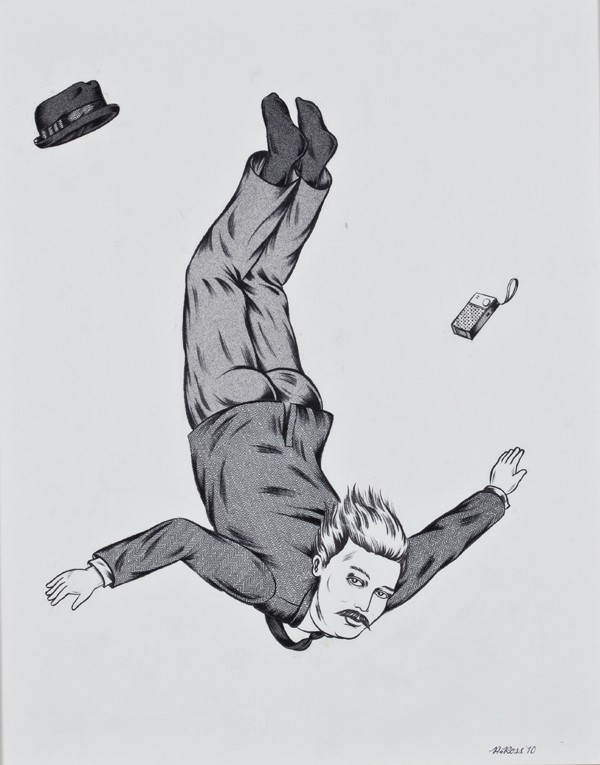For the last two decades, Aaron Rose has played a major role in shaping contemporary culture. A writer, curator, filmmaker, artist, gallerist, publisher, impresario: he has expressed his talent in all available formats of our time...
For the last two decades, Aaron Rose has played a major role in shaping contemporary culture. A writer, curator, filmmaker, artist, gallerist, publisher, impresario: he has expressed his talent in all available formats of our time. Amongst the many projects he has developed so far should be mentioned his role as a key player of the Beautiful Losers: in 2005, he published with Drago the legendary book Young Sleek and Full of Hell; he co-curated the Beautiful Losers art exhibit, and directed the documentary that was made on the movement. In 2009, he created a signature shoe model for DC Shoes, based on one of his artworks. Most recently, alongside with Jeffrey Deitch, he co-curated the 2011 exhibition “Art on the Streets” at Los Angeles MoCA; in 2011 as well, he co-authored the book Collage Culture: Examining the 21st Century Identity Crisis.
How would you connect fashion to elegance?
Elegance comes in many forms, and the people that are the most elegant are not the ones who wear the best clothes, who have the wardrobe or the pocketbook to experience fashion in the way most people experience elegance, in the way advertising dictates elegance to us. The most elegant people I know are the people who are brought to life with a sense of grace under pressure.
What is the role of history and art history in your conception of fashion?
Fashion is anti-history. Fashion is literally a non-history. My wife and I saw the Prada/Schiaparelli show at the Metropolitan Museum of Art in New York and, while it was beautiful, there was a certain degree of joke in it, because it was based on history. Fashion is based on what’s new. It’s always chasing the new. The difference between fashion and art history is that art tells the story of our time: art exists as the record of human beings on planet Earth. Because of the seasonal structure of fashion, I don’t know if it will ever be able to elevate to that same level of importance in our culture.
Would you describe fashion as a language and a discourse, as Barthes did?
It’s a discourse with itself. Commercial fashion has no discourse outside of itself. General style is the language of humanity. The way you dress, the way you put yourself together every morning when you walk out the door is the most important language that we speak. It transcends mathematics, philosophy, alphabet – all the languages in the world. Your clothes say more about you than anything you could ever write or produce.
"The way you dress is the most important language that we speak. It transcends mathematics, philosophy, alphabet – all the languages in the world. Your clothes say more about you than anything you could ever write or produce."
The word "intellectual" was coined in a time of great political distress. Does fashion have a political role? And in which way?
In my dream, fashion would be completely anti-intellectual, and completely pro-human.
Would you relate the idea of "fashion" to the one of "style"?
Fashion is the true universal language. The way you cruise through this planet is the way you are the most pure in your interaction with other human beings. Style’s role in our culture is the way we define ourselves to fellow human beings, completely outside of the fashion industry. People in the fashion industry are not leaders, they’re followers: they look at what people do, they copy it, and then they sell it back to us.
What does fashion have to do with intellectuality ?
I wish more people could understand that what they’re wearing and the way they present themselves to the world could enhance an intellectual discourse. Unfortunately, most of the world wears t-shirts, and flip-flops, and cargo shorts.
You have worked extensively considering the relationship between culture and subcultures. What is the relationship between fashion and subcultures?
All great fashion starts in the street: it’s usually underprivileged, unintellectual poor people that come up with the best ideas for fashion. So call that subculture. It always starts out of necessity: baggy pants with the low-hanging butt, the most prevalent style of the 21st century, started because they take the belt away when you get arrested in jail, so that you don’t hang yourself. The guys came out of jail with their pants low, and people wanted to copy them and be cool, and now Yves Saint Laurent is making those pants. The kids with the hoodies, walking around, that’s because of surveillance cameras in London. The whole country came under surveillance, and the kids started to wear hoods, so that they would not be identified, and then it became a style. Fashion starts as a necessity, then it’s copied and becomes a commodity.
The opposite of subculture would a culture of advertisement and entertainment. What is the role of fashion in the culture of entertainment and advertisement?
It pays the bills.
In two weeks Donatien will be interviewing the artist Nate Lowman
